BO1BLAW204: Company Constitution, Shareholder Rights & Amendments
VerifiedAdded on 2023/06/07
|9
|2319
|238
Report
AI Summary
This report provides a comprehensive analysis of the company constitution within the framework of the Corporations Act, 2001, focusing on its role in governing internal management, the process of amendment, and the protection of minority shareholder rights. It details how a company's constitution, alongside shareholder agreements, provides certainty and flexibility in governance, contrasting it with the replaceable rules of the Act. The report further examines the legal provisions and common law protections afforded to minority shareholders, particularly concerning the alteration of class rights and expropriation of shares, referencing key cases like Gambotto v WCP Ltd. It also highlights the binding nature of constitutional amendments on all shareholders and the ability to amend replaceable rules to grant security to minority shareholders, emphasizing the constitution's function as a contract defining the rights and obligations of the company, its directors, and members. Desklib provides access to similar solved assignments and study resources for students.
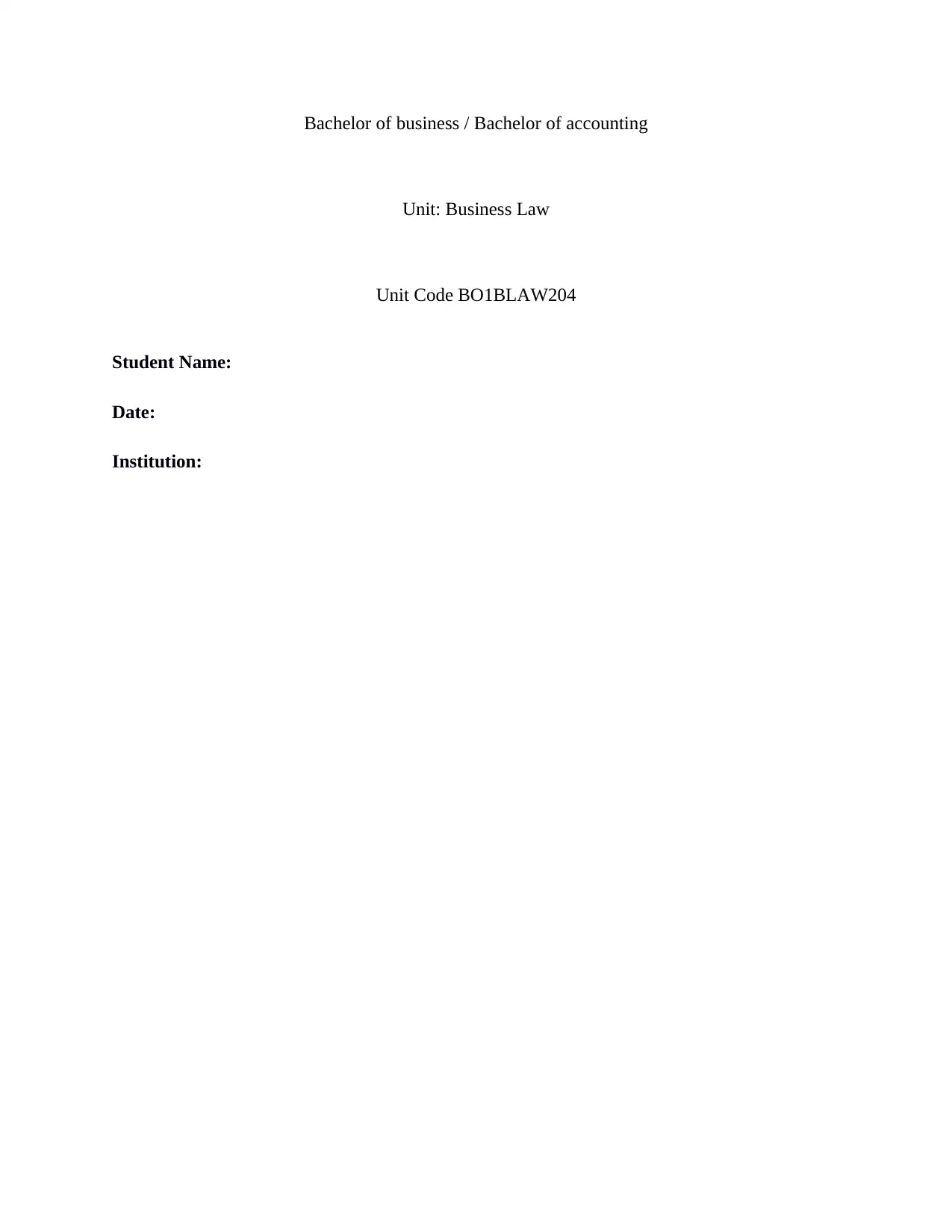
Bachelor of business / Bachelor of accounting
Unit: Business Law
Unit Code BO1BLAW204
Student Name:
Date:
Institution:
Unit: Business Law
Unit Code BO1BLAW204
Student Name:
Date:
Institution:
Paraphrase This Document
Need a fresh take? Get an instant paraphrase of this document with our AI Paraphraser
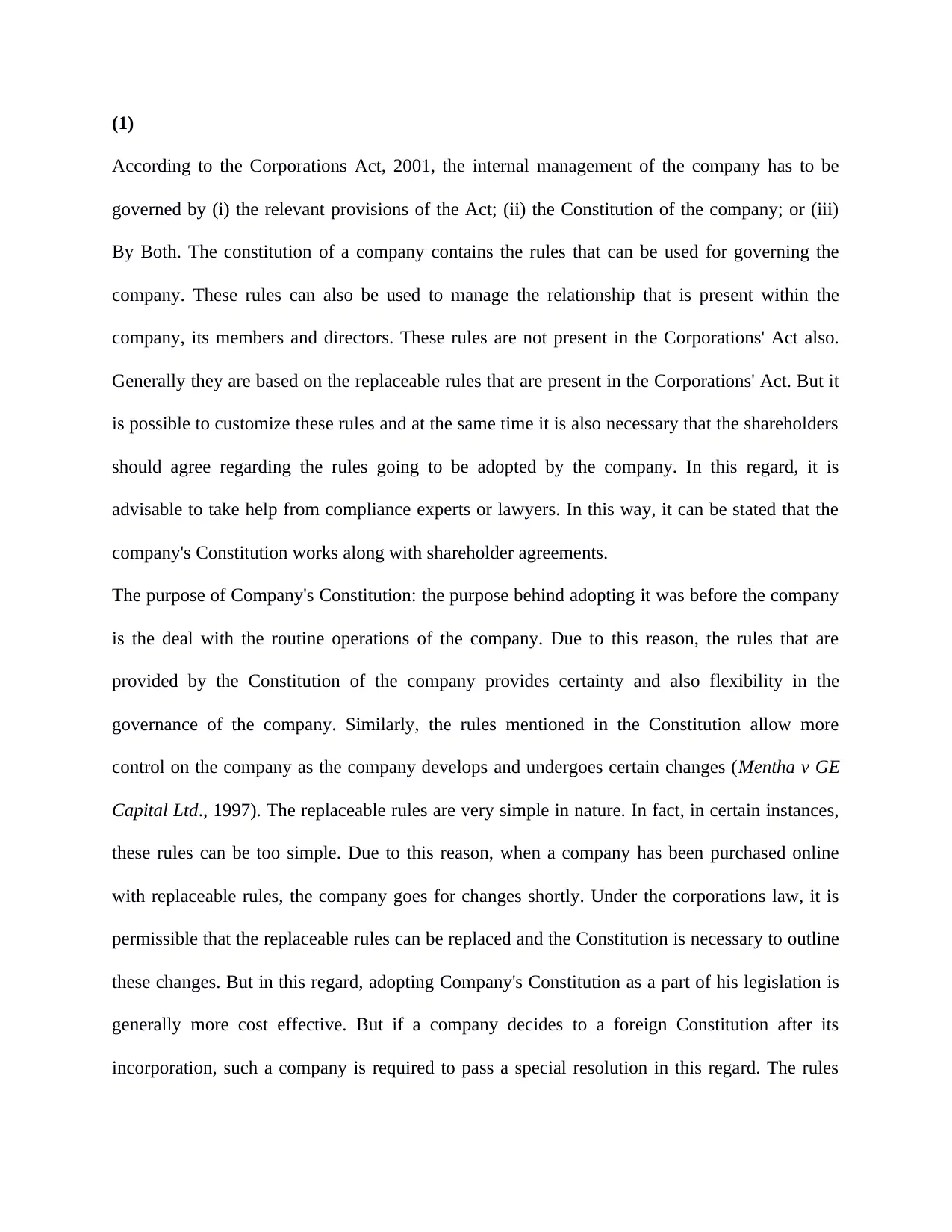
(1)
According to the Corporations Act, 2001, the internal management of the company has to be
governed by (i) the relevant provisions of the Act; (ii) the Constitution of the company; or (iii)
By Both. The constitution of a company contains the rules that can be used for governing the
company. These rules can also be used to manage the relationship that is present within the
company, its members and directors. These rules are not present in the Corporations' Act also.
Generally they are based on the replaceable rules that are present in the Corporations' Act. But it
is possible to customize these rules and at the same time it is also necessary that the shareholders
should agree regarding the rules going to be adopted by the company. In this regard, it is
advisable to take help from compliance experts or lawyers. In this way, it can be stated that the
company's Constitution works along with shareholder agreements.
The purpose of Company's Constitution: the purpose behind adopting it was before the company
is the deal with the routine operations of the company. Due to this reason, the rules that are
provided by the Constitution of the company provides certainty and also flexibility in the
governance of the company. Similarly, the rules mentioned in the Constitution allow more
control on the company as the company develops and undergoes certain changes (Mentha v GE
Capital Ltd., 1997). The replaceable rules are very simple in nature. In fact, in certain instances,
these rules can be too simple. Due to this reason, when a company has been purchased online
with replaceable rules, the company goes for changes shortly. Under the corporations law, it is
permissible that the replaceable rules can be replaced and the Constitution is necessary to outline
these changes. But in this regard, adopting Company's Constitution as a part of his legislation is
generally more cost effective. But if a company decides to a foreign Constitution after its
incorporation, such a company is required to pass a special resolution in this regard. The rules
According to the Corporations Act, 2001, the internal management of the company has to be
governed by (i) the relevant provisions of the Act; (ii) the Constitution of the company; or (iii)
By Both. The constitution of a company contains the rules that can be used for governing the
company. These rules can also be used to manage the relationship that is present within the
company, its members and directors. These rules are not present in the Corporations' Act also.
Generally they are based on the replaceable rules that are present in the Corporations' Act. But it
is possible to customize these rules and at the same time it is also necessary that the shareholders
should agree regarding the rules going to be adopted by the company. In this regard, it is
advisable to take help from compliance experts or lawyers. In this way, it can be stated that the
company's Constitution works along with shareholder agreements.
The purpose of Company's Constitution: the purpose behind adopting it was before the company
is the deal with the routine operations of the company. Due to this reason, the rules that are
provided by the Constitution of the company provides certainty and also flexibility in the
governance of the company. Similarly, the rules mentioned in the Constitution allow more
control on the company as the company develops and undergoes certain changes (Mentha v GE
Capital Ltd., 1997). The replaceable rules are very simple in nature. In fact, in certain instances,
these rules can be too simple. Due to this reason, when a company has been purchased online
with replaceable rules, the company goes for changes shortly. Under the corporations law, it is
permissible that the replaceable rules can be replaced and the Constitution is necessary to outline
these changes. But in this regard, adopting Company's Constitution as a part of his legislation is
generally more cost effective. But if a company decides to a foreign Constitution after its
incorporation, such a company is required to pass a special resolution in this regard. The rules
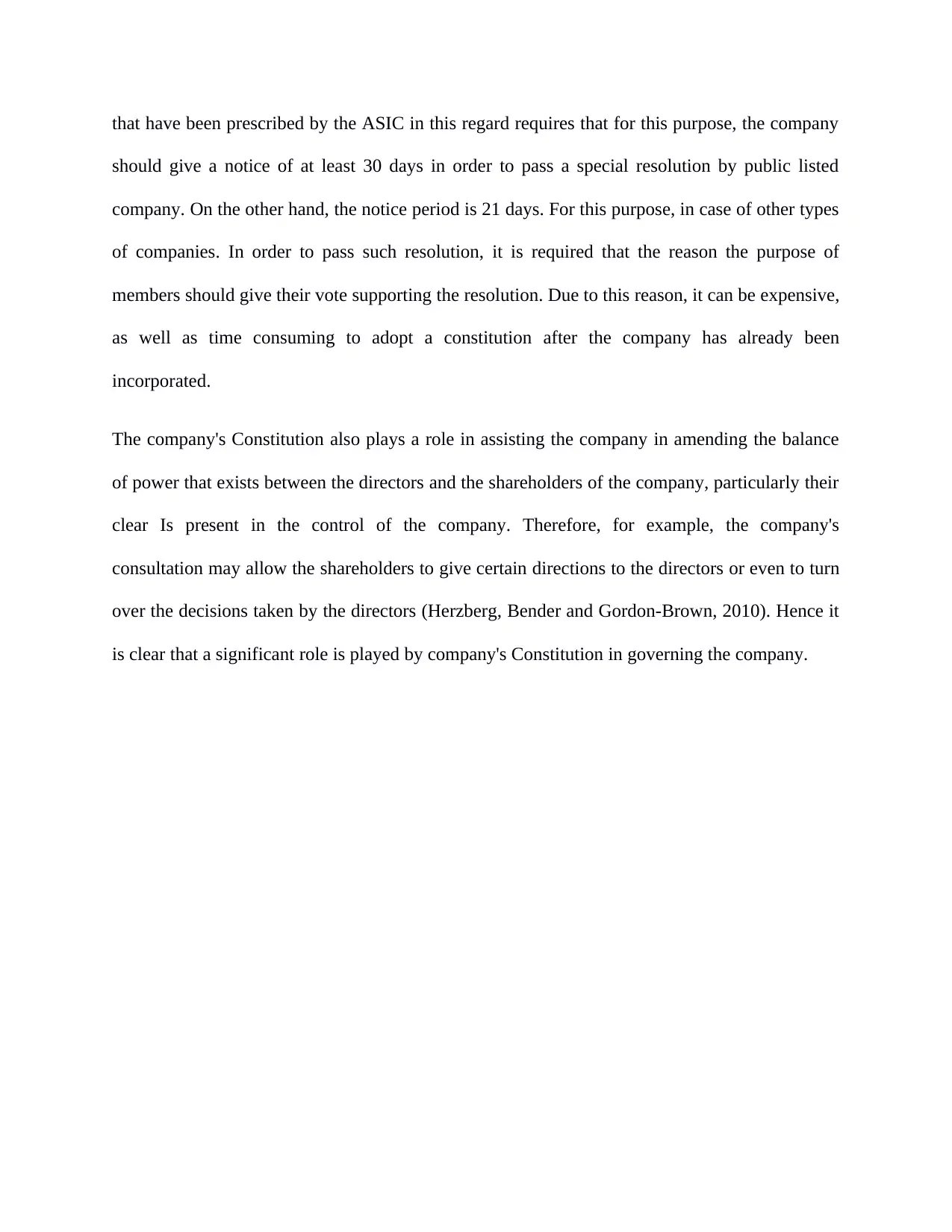
that have been prescribed by the ASIC in this regard requires that for this purpose, the company
should give a notice of at least 30 days in order to pass a special resolution by public listed
company. On the other hand, the notice period is 21 days. For this purpose, in case of other types
of companies. In order to pass such resolution, it is required that the reason the purpose of
members should give their vote supporting the resolution. Due to this reason, it can be expensive,
as well as time consuming to adopt a constitution after the company has already been
incorporated.
The company's Constitution also plays a role in assisting the company in amending the balance
of power that exists between the directors and the shareholders of the company, particularly their
clear Is present in the control of the company. Therefore, for example, the company's
consultation may allow the shareholders to give certain directions to the directors or even to turn
over the decisions taken by the directors (Herzberg, Bender and Gordon-Brown, 2010). Hence it
is clear that a significant role is played by company's Constitution in governing the company.
should give a notice of at least 30 days in order to pass a special resolution by public listed
company. On the other hand, the notice period is 21 days. For this purpose, in case of other types
of companies. In order to pass such resolution, it is required that the reason the purpose of
members should give their vote supporting the resolution. Due to this reason, it can be expensive,
as well as time consuming to adopt a constitution after the company has already been
incorporated.
The company's Constitution also plays a role in assisting the company in amending the balance
of power that exists between the directors and the shareholders of the company, particularly their
clear Is present in the control of the company. Therefore, for example, the company's
consultation may allow the shareholders to give certain directions to the directors or even to turn
over the decisions taken by the directors (Herzberg, Bender and Gordon-Brown, 2010). Hence it
is clear that a significant role is played by company's Constitution in governing the company.
⊘ This is a preview!⊘
Do you want full access?
Subscribe today to unlock all pages.

Trusted by 1+ million students worldwide
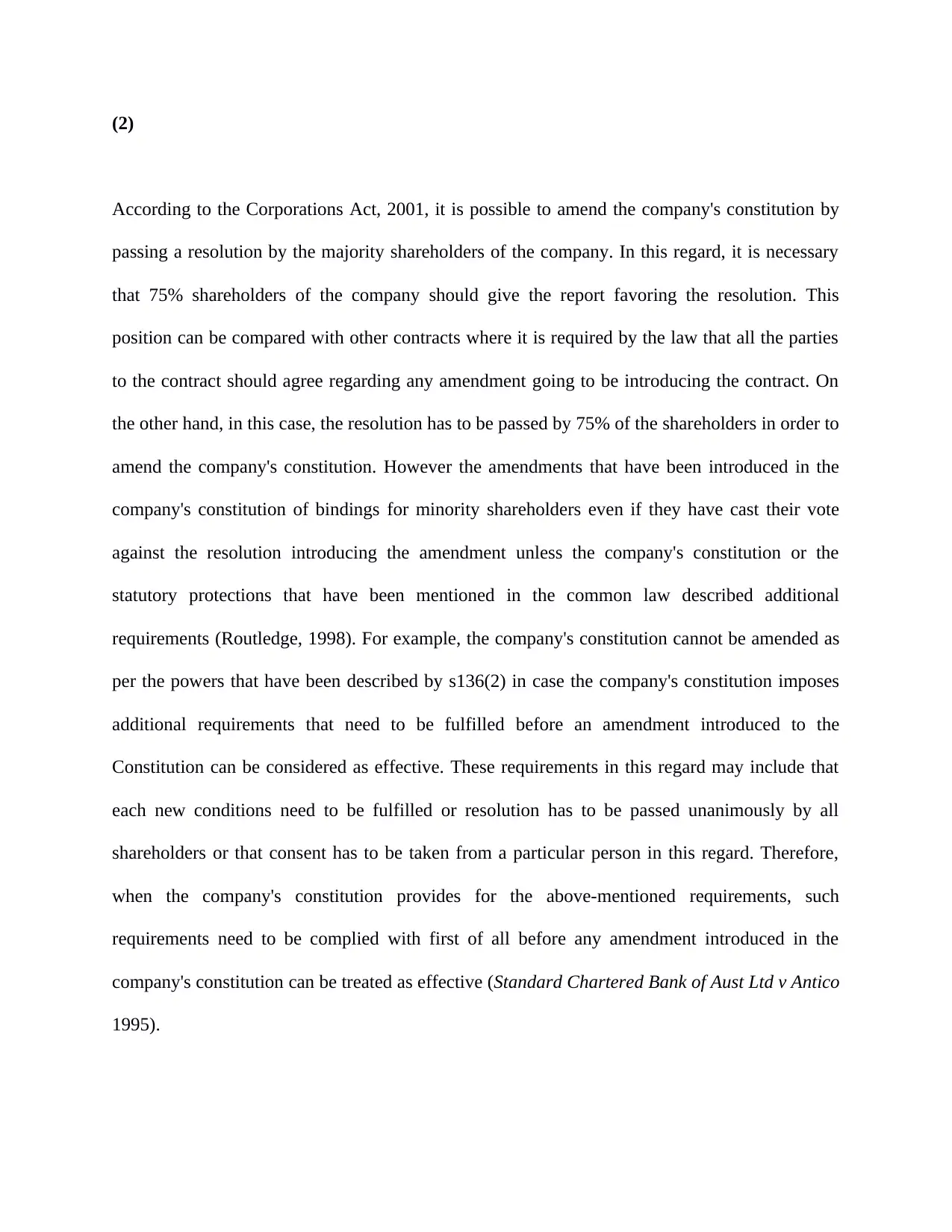
(2)
According to the Corporations Act, 2001, it is possible to amend the company's constitution by
passing a resolution by the majority shareholders of the company. In this regard, it is necessary
that 75% shareholders of the company should give the report favoring the resolution. This
position can be compared with other contracts where it is required by the law that all the parties
to the contract should agree regarding any amendment going to be introducing the contract. On
the other hand, in this case, the resolution has to be passed by 75% of the shareholders in order to
amend the company's constitution. However the amendments that have been introduced in the
company's constitution of bindings for minority shareholders even if they have cast their vote
against the resolution introducing the amendment unless the company's constitution or the
statutory protections that have been mentioned in the common law described additional
requirements (Routledge, 1998). For example, the company's constitution cannot be amended as
per the powers that have been described by s136(2) in case the company's constitution imposes
additional requirements that need to be fulfilled before an amendment introduced to the
Constitution can be considered as effective. These requirements in this regard may include that
each new conditions need to be fulfilled or resolution has to be passed unanimously by all
shareholders or that consent has to be taken from a particular person in this regard. Therefore,
when the company's constitution provides for the above-mentioned requirements, such
requirements need to be complied with first of all before any amendment introduced in the
company's constitution can be treated as effective (Standard Chartered Bank of Aust Ltd v Antico
1995).
According to the Corporations Act, 2001, it is possible to amend the company's constitution by
passing a resolution by the majority shareholders of the company. In this regard, it is necessary
that 75% shareholders of the company should give the report favoring the resolution. This
position can be compared with other contracts where it is required by the law that all the parties
to the contract should agree regarding any amendment going to be introducing the contract. On
the other hand, in this case, the resolution has to be passed by 75% of the shareholders in order to
amend the company's constitution. However the amendments that have been introduced in the
company's constitution of bindings for minority shareholders even if they have cast their vote
against the resolution introducing the amendment unless the company's constitution or the
statutory protections that have been mentioned in the common law described additional
requirements (Routledge, 1998). For example, the company's constitution cannot be amended as
per the powers that have been described by s136(2) in case the company's constitution imposes
additional requirements that need to be fulfilled before an amendment introduced to the
Constitution can be considered as effective. These requirements in this regard may include that
each new conditions need to be fulfilled or resolution has to be passed unanimously by all
shareholders or that consent has to be taken from a particular person in this regard. Therefore,
when the company's constitution provides for the above-mentioned requirements, such
requirements need to be complied with first of all before any amendment introduced in the
company's constitution can be treated as effective (Standard Chartered Bank of Aust Ltd v Antico
1995).
Paraphrase This Document
Need a fresh take? Get an instant paraphrase of this document with our AI Paraphraser
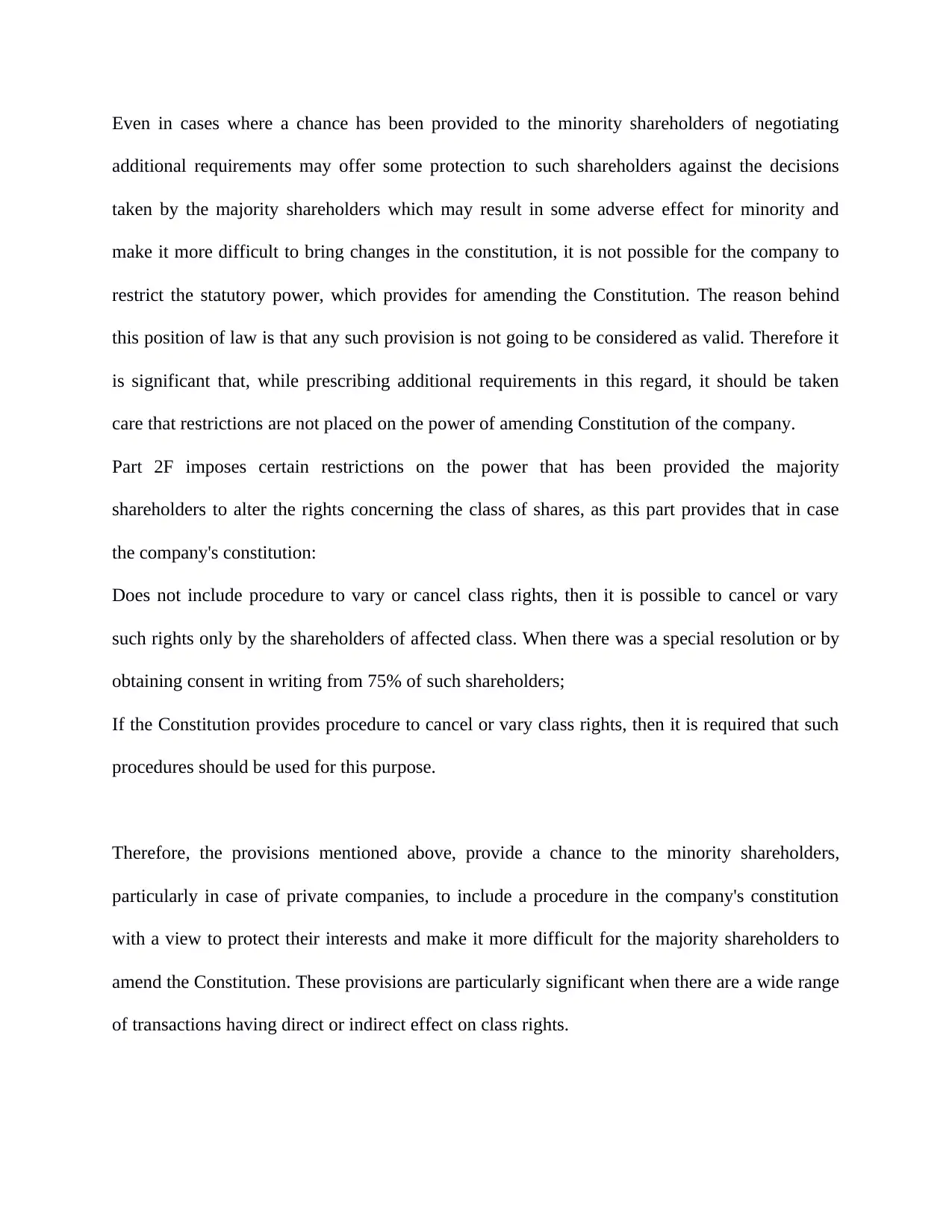
Even in cases where a chance has been provided to the minority shareholders of negotiating
additional requirements may offer some protection to such shareholders against the decisions
taken by the majority shareholders which may result in some adverse effect for minority and
make it more difficult to bring changes in the constitution, it is not possible for the company to
restrict the statutory power, which provides for amending the Constitution. The reason behind
this position of law is that any such provision is not going to be considered as valid. Therefore it
is significant that, while prescribing additional requirements in this regard, it should be taken
care that restrictions are not placed on the power of amending Constitution of the company.
Part 2F imposes certain restrictions on the power that has been provided the majority
shareholders to alter the rights concerning the class of shares, as this part provides that in case
the company's constitution:
Does not include procedure to vary or cancel class rights, then it is possible to cancel or vary
such rights only by the shareholders of affected class. When there was a special resolution or by
obtaining consent in writing from 75% of such shareholders;
If the Constitution provides procedure to cancel or vary class rights, then it is required that such
procedures should be used for this purpose.
Therefore, the provisions mentioned above, provide a chance to the minority shareholders,
particularly in case of private companies, to include a procedure in the company's constitution
with a view to protect their interests and make it more difficult for the majority shareholders to
amend the Constitution. These provisions are particularly significant when there are a wide range
of transactions having direct or indirect effect on class rights.
additional requirements may offer some protection to such shareholders against the decisions
taken by the majority shareholders which may result in some adverse effect for minority and
make it more difficult to bring changes in the constitution, it is not possible for the company to
restrict the statutory power, which provides for amending the Constitution. The reason behind
this position of law is that any such provision is not going to be considered as valid. Therefore it
is significant that, while prescribing additional requirements in this regard, it should be taken
care that restrictions are not placed on the power of amending Constitution of the company.
Part 2F imposes certain restrictions on the power that has been provided the majority
shareholders to alter the rights concerning the class of shares, as this part provides that in case
the company's constitution:
Does not include procedure to vary or cancel class rights, then it is possible to cancel or vary
such rights only by the shareholders of affected class. When there was a special resolution or by
obtaining consent in writing from 75% of such shareholders;
If the Constitution provides procedure to cancel or vary class rights, then it is required that such
procedures should be used for this purpose.
Therefore, the provisions mentioned above, provide a chance to the minority shareholders,
particularly in case of private companies, to include a procedure in the company's constitution
with a view to protect their interests and make it more difficult for the majority shareholders to
amend the Constitution. These provisions are particularly significant when there are a wide range
of transactions having direct or indirect effect on class rights.
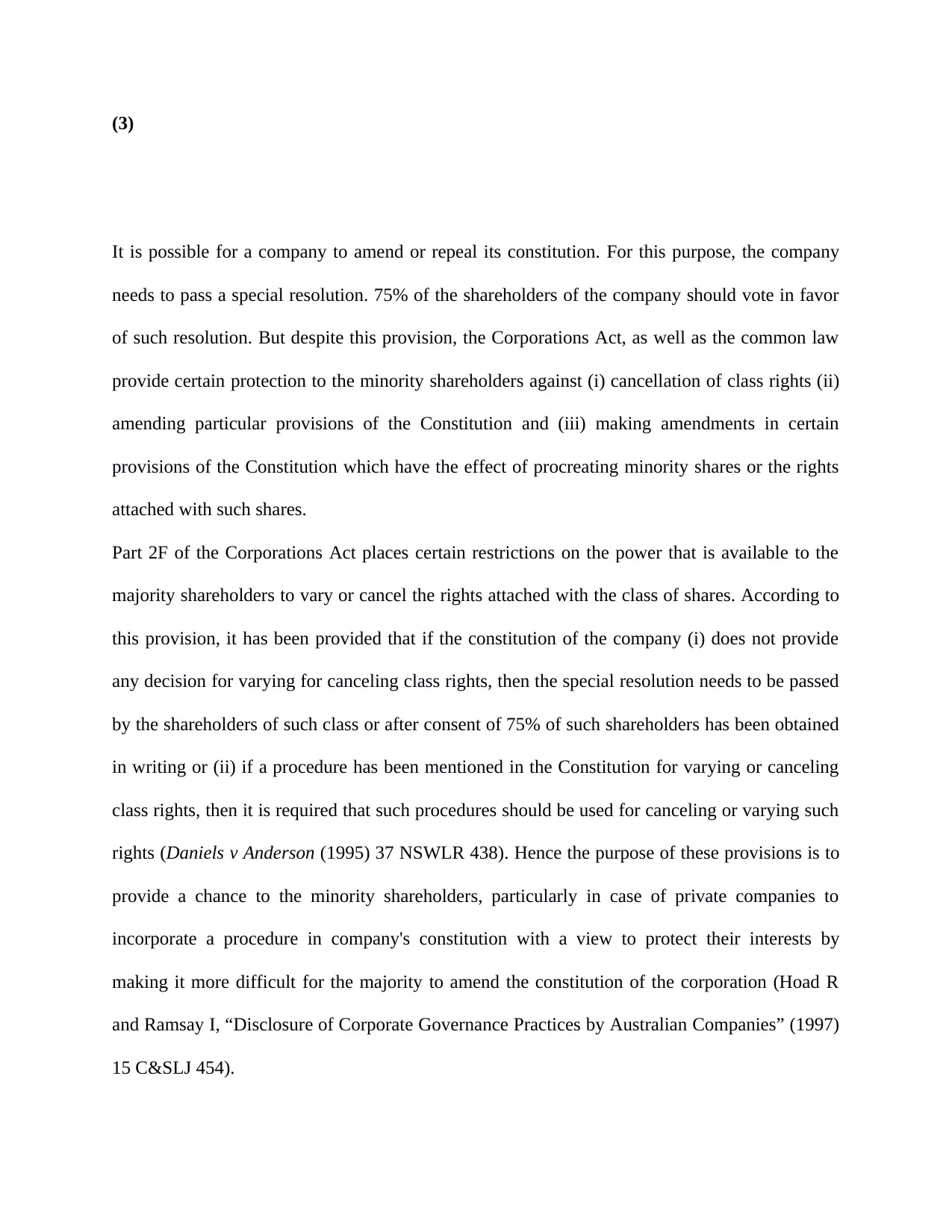
(3)
It is possible for a company to amend or repeal its constitution. For this purpose, the company
needs to pass a special resolution. 75% of the shareholders of the company should vote in favor
of such resolution. But despite this provision, the Corporations Act, as well as the common law
provide certain protection to the minority shareholders against (i) cancellation of class rights (ii)
amending particular provisions of the Constitution and (iii) making amendments in certain
provisions of the Constitution which have the effect of procreating minority shares or the rights
attached with such shares.
Part 2F of the Corporations Act places certain restrictions on the power that is available to the
majority shareholders to vary or cancel the rights attached with the class of shares. According to
this provision, it has been provided that if the constitution of the company (i) does not provide
any decision for varying for canceling class rights, then the special resolution needs to be passed
by the shareholders of such class or after consent of 75% of such shareholders has been obtained
in writing or (ii) if a procedure has been mentioned in the Constitution for varying or canceling
class rights, then it is required that such procedures should be used for canceling or varying such
rights (Daniels v Anderson (1995) 37 NSWLR 438). Hence the purpose of these provisions is to
provide a chance to the minority shareholders, particularly in case of private companies to
incorporate a procedure in company's constitution with a view to protect their interests by
making it more difficult for the majority to amend the constitution of the corporation (Hoad R
and Ramsay I, “Disclosure of Corporate Governance Practices by Australian Companies” (1997)
15 C&SLJ 454).
It is possible for a company to amend or repeal its constitution. For this purpose, the company
needs to pass a special resolution. 75% of the shareholders of the company should vote in favor
of such resolution. But despite this provision, the Corporations Act, as well as the common law
provide certain protection to the minority shareholders against (i) cancellation of class rights (ii)
amending particular provisions of the Constitution and (iii) making amendments in certain
provisions of the Constitution which have the effect of procreating minority shares or the rights
attached with such shares.
Part 2F of the Corporations Act places certain restrictions on the power that is available to the
majority shareholders to vary or cancel the rights attached with the class of shares. According to
this provision, it has been provided that if the constitution of the company (i) does not provide
any decision for varying for canceling class rights, then the special resolution needs to be passed
by the shareholders of such class or after consent of 75% of such shareholders has been obtained
in writing or (ii) if a procedure has been mentioned in the Constitution for varying or canceling
class rights, then it is required that such procedures should be used for canceling or varying such
rights (Daniels v Anderson (1995) 37 NSWLR 438). Hence the purpose of these provisions is to
provide a chance to the minority shareholders, particularly in case of private companies to
incorporate a procedure in company's constitution with a view to protect their interests by
making it more difficult for the majority to amend the constitution of the corporation (Hoad R
and Ramsay I, “Disclosure of Corporate Governance Practices by Australian Companies” (1997)
15 C&SLJ 454).
⊘ This is a preview!⊘
Do you want full access?
Subscribe today to unlock all pages.

Trusted by 1+ million students worldwide
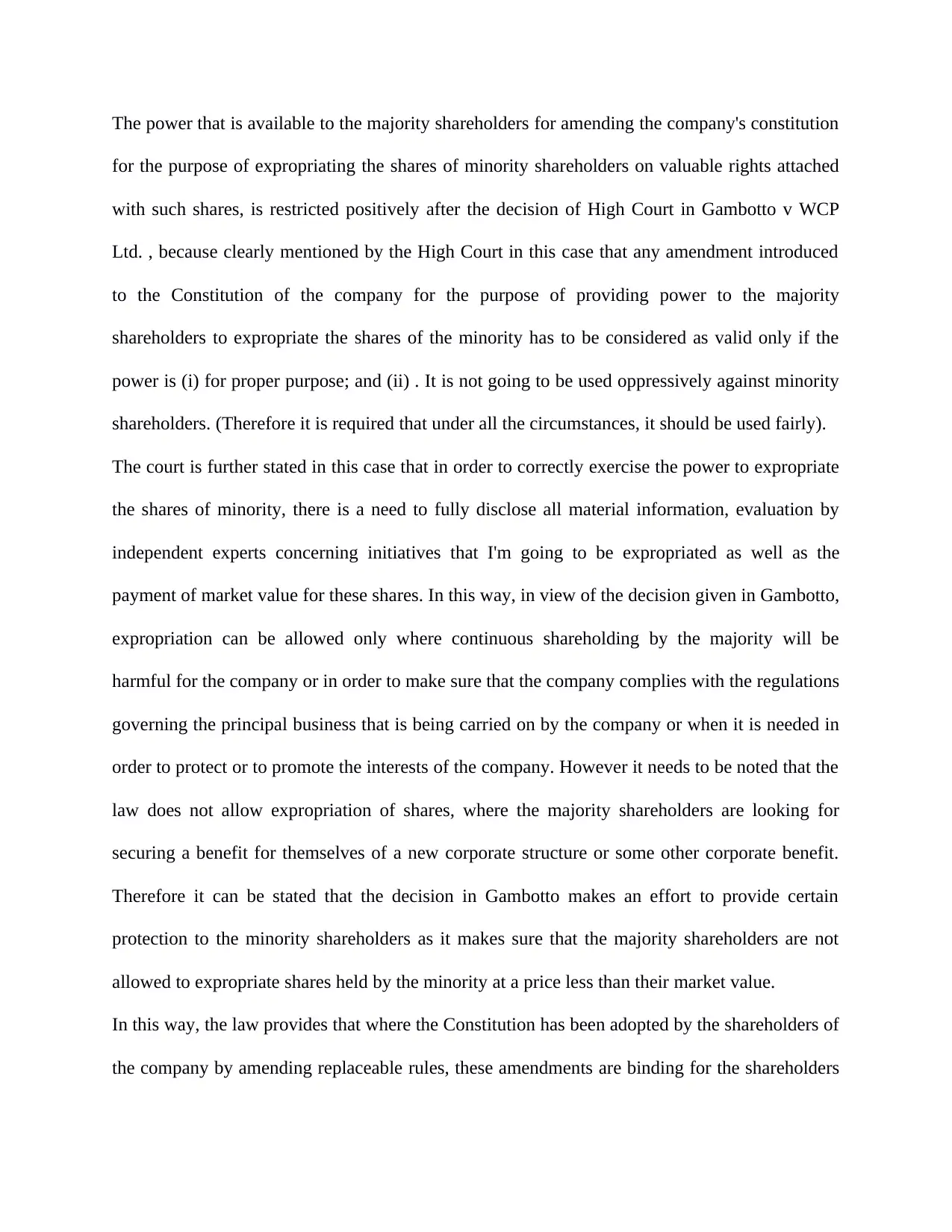
The power that is available to the majority shareholders for amending the company's constitution
for the purpose of expropriating the shares of minority shareholders on valuable rights attached
with such shares, is restricted positively after the decision of High Court in Gambotto v WCP
Ltd. , because clearly mentioned by the High Court in this case that any amendment introduced
to the Constitution of the company for the purpose of providing power to the majority
shareholders to expropriate the shares of the minority has to be considered as valid only if the
power is (i) for proper purpose; and (ii) . It is not going to be used oppressively against minority
shareholders. (Therefore it is required that under all the circumstances, it should be used fairly).
The court is further stated in this case that in order to correctly exercise the power to expropriate
the shares of minority, there is a need to fully disclose all material information, evaluation by
independent experts concerning initiatives that I'm going to be expropriated as well as the
payment of market value for these shares. In this way, in view of the decision given in Gambotto,
expropriation can be allowed only where continuous shareholding by the majority will be
harmful for the company or in order to make sure that the company complies with the regulations
governing the principal business that is being carried on by the company or when it is needed in
order to protect or to promote the interests of the company. However it needs to be noted that the
law does not allow expropriation of shares, where the majority shareholders are looking for
securing a benefit for themselves of a new corporate structure or some other corporate benefit.
Therefore it can be stated that the decision in Gambotto makes an effort to provide certain
protection to the minority shareholders as it makes sure that the majority shareholders are not
allowed to expropriate shares held by the minority at a price less than their market value.
In this way, the law provides that where the Constitution has been adopted by the shareholders of
the company by amending replaceable rules, these amendments are binding for the shareholders
for the purpose of expropriating the shares of minority shareholders on valuable rights attached
with such shares, is restricted positively after the decision of High Court in Gambotto v WCP
Ltd. , because clearly mentioned by the High Court in this case that any amendment introduced
to the Constitution of the company for the purpose of providing power to the majority
shareholders to expropriate the shares of the minority has to be considered as valid only if the
power is (i) for proper purpose; and (ii) . It is not going to be used oppressively against minority
shareholders. (Therefore it is required that under all the circumstances, it should be used fairly).
The court is further stated in this case that in order to correctly exercise the power to expropriate
the shares of minority, there is a need to fully disclose all material information, evaluation by
independent experts concerning initiatives that I'm going to be expropriated as well as the
payment of market value for these shares. In this way, in view of the decision given in Gambotto,
expropriation can be allowed only where continuous shareholding by the majority will be
harmful for the company or in order to make sure that the company complies with the regulations
governing the principal business that is being carried on by the company or when it is needed in
order to protect or to promote the interests of the company. However it needs to be noted that the
law does not allow expropriation of shares, where the majority shareholders are looking for
securing a benefit for themselves of a new corporate structure or some other corporate benefit.
Therefore it can be stated that the decision in Gambotto makes an effort to provide certain
protection to the minority shareholders as it makes sure that the majority shareholders are not
allowed to expropriate shares held by the minority at a price less than their market value.
In this way, the law provides that where the Constitution has been adopted by the shareholders of
the company by amending replaceable rules, these amendments are binding for the shareholders
Paraphrase This Document
Need a fresh take? Get an instant paraphrase of this document with our AI Paraphraser
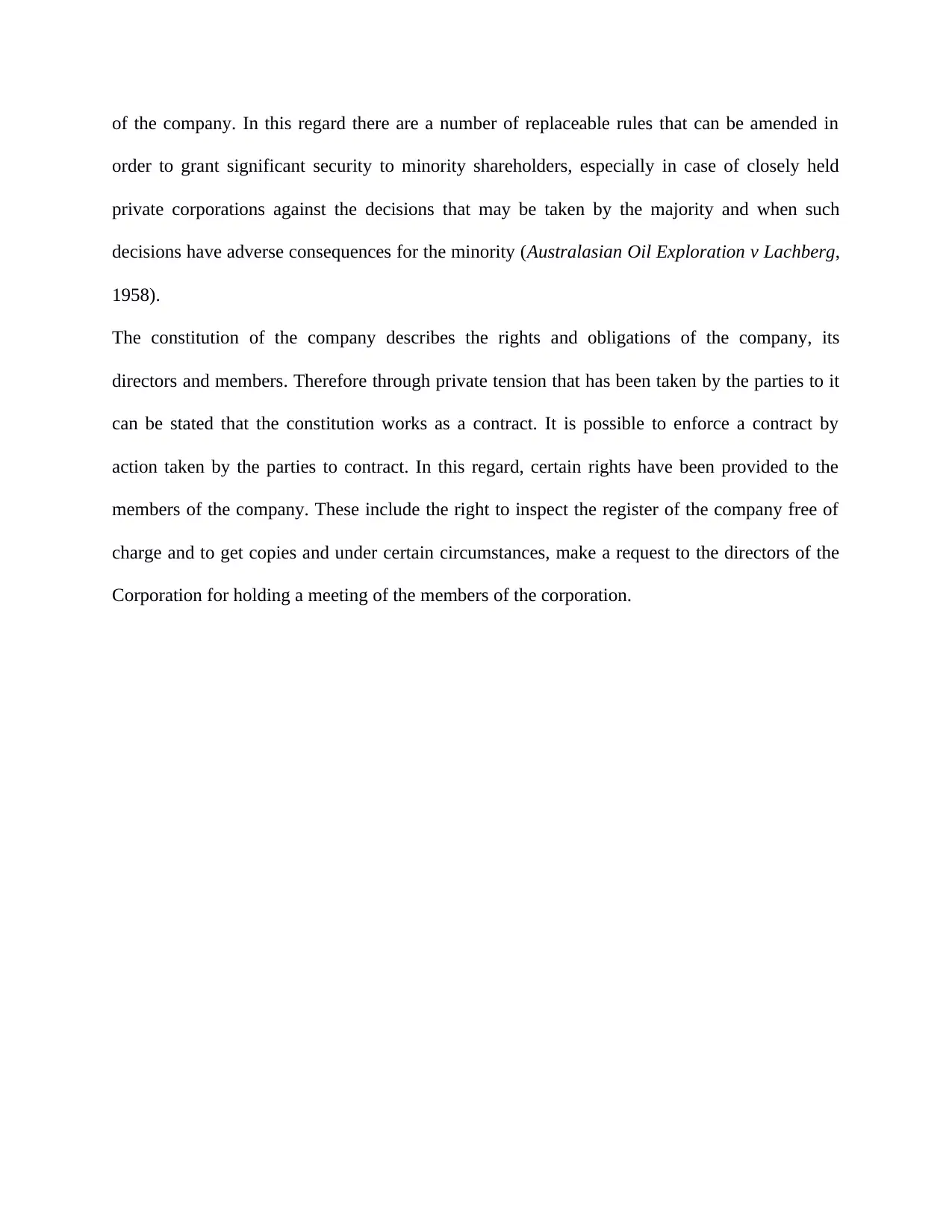
of the company. In this regard there are a number of replaceable rules that can be amended in
order to grant significant security to minority shareholders, especially in case of closely held
private corporations against the decisions that may be taken by the majority and when such
decisions have adverse consequences for the minority (Australasian Oil Exploration v Lachberg,
1958).
The constitution of the company describes the rights and obligations of the company, its
directors and members. Therefore through private tension that has been taken by the parties to it
can be stated that the constitution works as a contract. It is possible to enforce a contract by
action taken by the parties to contract. In this regard, certain rights have been provided to the
members of the company. These include the right to inspect the register of the company free of
charge and to get copies and under certain circumstances, make a request to the directors of the
Corporation for holding a meeting of the members of the corporation.
order to grant significant security to minority shareholders, especially in case of closely held
private corporations against the decisions that may be taken by the majority and when such
decisions have adverse consequences for the minority (Australasian Oil Exploration v Lachberg,
1958).
The constitution of the company describes the rights and obligations of the company, its
directors and members. Therefore through private tension that has been taken by the parties to it
can be stated that the constitution works as a contract. It is possible to enforce a contract by
action taken by the parties to contract. In this regard, certain rights have been provided to the
members of the company. These include the right to inspect the register of the company free of
charge and to get copies and under certain circumstances, make a request to the directors of the
Corporation for holding a meeting of the members of the corporation.
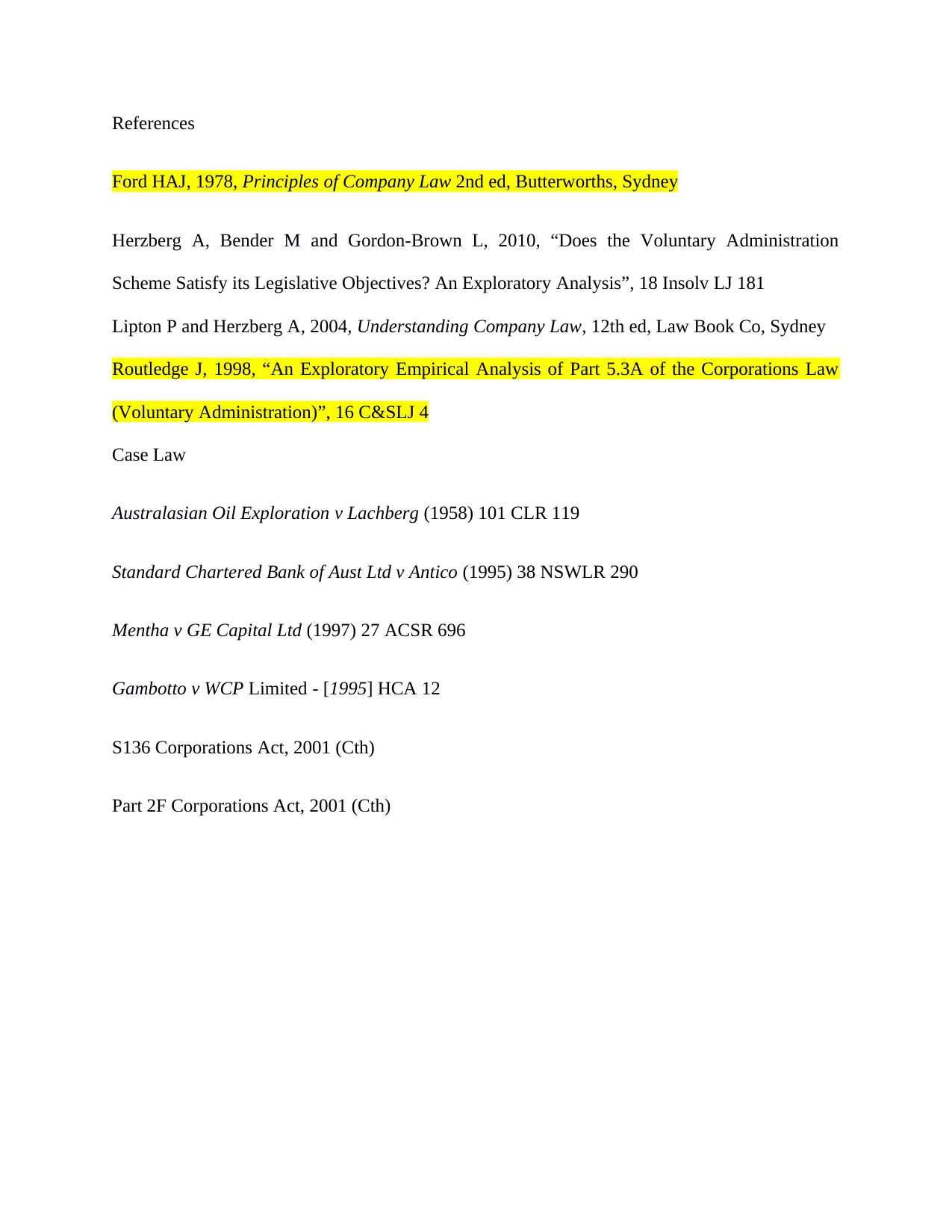
References
Ford HAJ, 1978, Principles of Company Law 2nd ed, Butterworths, Sydney
Herzberg A, Bender M and Gordon-Brown L, 2010, “Does the Voluntary Administration
Scheme Satisfy its Legislative Objectives? An Exploratory Analysis”, 18 Insolv LJ 181
Lipton P and Herzberg A, 2004, Understanding Company Law, 12th ed, Law Book Co, Sydney
Routledge J, 1998, “An Exploratory Empirical Analysis of Part 5.3A of the Corporations Law
(Voluntary Administration)”, 16 C&SLJ 4
Case Law
Australasian Oil Exploration v Lachberg (1958) 101 CLR 119
Standard Chartered Bank of Aust Ltd v Antico (1995) 38 NSWLR 290
Mentha v GE Capital Ltd (1997) 27 ACSR 696
Gambotto v WCP Limited - [1995] HCA 12
S136 Corporations Act, 2001 (Cth)
Part 2F Corporations Act, 2001 (Cth)
Ford HAJ, 1978, Principles of Company Law 2nd ed, Butterworths, Sydney
Herzberg A, Bender M and Gordon-Brown L, 2010, “Does the Voluntary Administration
Scheme Satisfy its Legislative Objectives? An Exploratory Analysis”, 18 Insolv LJ 181
Lipton P and Herzberg A, 2004, Understanding Company Law, 12th ed, Law Book Co, Sydney
Routledge J, 1998, “An Exploratory Empirical Analysis of Part 5.3A of the Corporations Law
(Voluntary Administration)”, 16 C&SLJ 4
Case Law
Australasian Oil Exploration v Lachberg (1958) 101 CLR 119
Standard Chartered Bank of Aust Ltd v Antico (1995) 38 NSWLR 290
Mentha v GE Capital Ltd (1997) 27 ACSR 696
Gambotto v WCP Limited - [1995] HCA 12
S136 Corporations Act, 2001 (Cth)
Part 2F Corporations Act, 2001 (Cth)
⊘ This is a preview!⊘
Do you want full access?
Subscribe today to unlock all pages.

Trusted by 1+ million students worldwide
1 out of 9
Related Documents
Your All-in-One AI-Powered Toolkit for Academic Success.
+13062052269
info@desklib.com
Available 24*7 on WhatsApp / Email
![[object Object]](/_next/static/media/star-bottom.7253800d.svg)
Unlock your academic potential
Copyright © 2020–2026 A2Z Services. All Rights Reserved. Developed and managed by ZUCOL.





